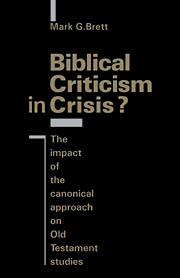Book contents
- Frontmatter
- Contents
- Acknowledgements
- List of abbreviations
- Introduction: Setting the scene
- 1 Distinguishing interpretative interests
- 2 The development of canonical exegesis
- 3 ‘Introduction’ and Old Testament theology
- 4 Has Childs fallen into Gabler's ditch?
- 5 Textual intentions and histories of reception
- 6 The future of the canonical approach
- Notes
- Bibliography
- Bibliographical key to the works of Brevard S. Childs
- Index of Old Testament references
- Index of subjects
- Index of authors
1 - Distinguishing interpretative interests
Published online by Cambridge University Press: 10 October 2009
- Frontmatter
- Contents
- Acknowledgements
- List of abbreviations
- Introduction: Setting the scene
- 1 Distinguishing interpretative interests
- 2 The development of canonical exegesis
- 3 ‘Introduction’ and Old Testament theology
- 4 Has Childs fallen into Gabler's ditch?
- 5 Textual intentions and histories of reception
- 6 The future of the canonical approach
- Notes
- Bibliography
- Bibliographical key to the works of Brevard S. Childs
- Index of Old Testament references
- Index of subjects
- Index of authors
Summary
GHILDS VERSUS GOTTWALD
The first problem with the canonical approach is its totalitarian tendency; Childs has sometimes argued as if everyone should become interpreters after his own image. At other times he envisions a more pluralist situation for biblical studies. The argument of this chapter is that the second Childs is to be preferred. Our discipline now includes a whole range of interpretative interests which are logically distinct, and it is indeed questionable whether biblical studies should be thought of as a single discipline at all. Some might feel that this diversity of interests amounts to a crisis in biblical studies that will resolve itself in one direction or another. But it seems more likely that our different interpretative goals will turn out to be permanently incommensurable. It is clear, however, that a number of our current methodological disputes are confused by a failure to recognize our plurality, and this especially applies to the work of Childs. First, he has attacked some positions which he need not have, and second, he has tried to include too many different tasks under the label of the canonical approach.
As an example of a confused attack, consider his recent comments on materialist approaches to the Hebrew Bible – those which place biblical texts against a reconstructed background of environment, technology, economy, and sociology. Childs argues, for example, that the work of Norman Gottwald ‘destroys the need for closely hearing the text on its verbal level’ (1985: 25). Gottwald has responded, almost predictably, by saying that Childs fails to account for the sociological matrices within which all texts are shaped.
- Type
- Chapter
- Information
- Biblical Criticism in Crisis?The Impact of the Canonical Approach on Old Testament Studies, pp. 11 - 26Publisher: Cambridge University PressPrint publication year: 1991



